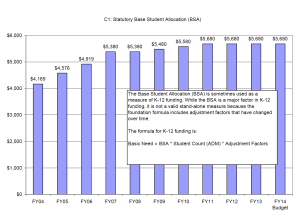My review of The Divide on GoodReads appears below. Yes, I was a bit frustrated that in all the reviews of this book there was not a single mention of this glaring error, which of course led me to wonder how many other errors there were in this or any of the other books being touted from bestseller and other “lists”. And so I started a journey. First I attempted to being this to the attention of the publishers, who indicated they weren’t interested and I should write to the author, so I did. The author failed to respond. I commented on book reviews at major publications (no traction) and eventually added some material to the wikipedia page on the book (limited to the the book text on the issue, and the contents of the report, with a footnote to a link for the letter sent to publisher and author.). It turns out that wikipedia requires that entries must reference published sources, and published does not include self-publication. In other words, if you have a letter from the President that says that he wants to get something accomplished regarding immigration in 2016, you can’t reference that letter until some bozo on HuffPo mentions it first. Lions and tiger and bears!
Don’t get me wrong! I think it’s a very strong book and makes powerful arguments. But at least one claim is introduced as based on an argument that is easily demonstrated to be false. But that is not my underlying concern here. My real concern is that the book is being lauded for its expert research, while no one will even acknowledge any errors in the book. And so, to Goodreads (as I mention, my review appears at the foot of this post. )
But first, the impetus for this post. It turns out that noting that the first chapter of a wildly popular “liberal” book is based on the deliberate misrepresentation that the Obama Whitehouse was involved in Senator Ted Steven’s prosecution is nitpicking about something no one remembers has turned me in to FoxNews style Obamabot who wants to dump the baby with the bathwater! Read it for yourself:
[Geoffrey] “* * * As usual, this book is expertly researched. * * *”
[Marc] “Amazes me people can say this work is expertly researched when the first chapter is in fact based on gross inaccuracies.”
[Geoffrey] “Yeah, your review looks a bit to much like a FoxNews tactic turned Obamabot defense: find one nit to pick about a paragraph no one remembers, and say that the baby must go with the bathwater. Not buying it.”
[Marc] “Interesting comment. My concern is that Taibbi’s argument is that the Dems are as guilty of the offenses he presents as the Republicans (which is arguably true) but as a basis for that argument he launches in to a wholly unrelated domain regarding Senator Stevens and then totally botches his argument (no, the Dems had nothing to do with the Stevens prosecution and the documentation of this error, which goes to the basis of his argument, has nothing in common with Fox News, lol.) Yes, the book is expertly argued, but no, the book is not expertly researched, if by that you mean that the research supports the argument. I did not say toss the baby with the bathwater, but I am saying that we need to spend more time with the research that is offered to support such books, because, as you intimate, no one is in fact reading the footnotes. Moreover, if you wish to argue that the argument regarding Stevens is nominal and unimportant, then I suppose that is a criticism of Taibbi, as in, why would he include as a major part of an early chapter in his book a claim (that is demonstrably false) intended to set up the one the premises for the rest of the book. This is not about political partisanship; this is about the publication of widely acclaimed books that have major misrepresentations anchoring their arguments.”
[Geoffrey] “I assume you’re one of those commenters that gets paid by the word. I didn’t know you guys trolled even goodreads. Is this a proving ground you experiment in before graduating to Facebook and Twitter?”
[Marc] “Let’s try to stay focused, shall we?
You claim the book is expertly researched.
I demonstrate that a major argument in the first chapter is based on gross misrepresentation of the facts that can be appreciated by anyone.
You fail and or refuse to acknowledge the errors and claim I am “nitpicking”
I point out that getting one’s shorts in a twist about a typo in a footnote is nitpicking, while demonstrating that the introduction of a major theme in the book, complicity of the Democratic party, based on a false argument, is not, whether or not the the argument is viable (I agree it is) or well made (I also agree it is).
The upshot would appear to be that you don’t know what “expertly researched” means and you are frightened of rational discussion (do the mean little wordies bitesies?)
When you wish to contribute something substantive, let me know. I enjoy Taibbi’s writing and am disappointed that this kind of crap pops up as a cornerstone of a major theme in his book.”
In sum, Solomon’s wisdom (yes, I know I am mixing metaphors, but Solomon’s ancient test to determine what is really important seems related to bath water here…) has been turned on its head. We are being asked to ignore the bathwater because of the baby. And we are attacking those that read critically. If that sounds like a far right tactic, well, guess what, it appears to be a a tactic of the left now too.
My question to Taibbi, and Taibbi groupies I suppose, is what The Divide would look like if the error I found (and other errors if they exist) are removed. If there would be no real impact on the argument, then why not fix the errors, admit the mistakes and move on (as opposed to pretending that the basis for your argument is unimportant.) If, on the other hand, addressing errors would be problematic, then that is truly a cause for concern.
In other words, such issues challenge an author’s credibility. At least for those who remember what he wrote…
 I was puzzled by Matt Taibbi’s attack on the Obama Whitehouse over the Steven’s litigation, as much of Alaska was puzzled by the apparent intent of the Bush Whitehouse to not only keep Stevens out of the Senate, but to accomplish same illegally. The suggestion that Obama or his appointees, whatever you may think of the current administration, had anything to do with the Stevens prosecution other than the “clean up” (such as it was) is simply ludicrous. Yet, there it was, introducing and underscoring “Unintended Consequences.”
I was puzzled by Matt Taibbi’s attack on the Obama Whitehouse over the Steven’s litigation, as much of Alaska was puzzled by the apparent intent of the Bush Whitehouse to not only keep Stevens out of the Senate, but to accomplish same illegally. The suggestion that Obama or his appointees, whatever you may think of the current administration, had anything to do with the Stevens prosecution other than the “clean up” (such as it was) is simply ludicrous. Yet, there it was, introducing and underscoring “Unintended Consequences.”
“The so-called Schuelke report would not come out for three more years, but when it did surface, it contained a startling tale. Obama’s new appointees had inserted a young prosecutor named Brenda Morris as lead prosecutor in the Stevens case days before trial, infuriating the rank-and-file prosecutors in Alaska who had run the case since its inception.”
But the Report (which can be found here for those without ECF access: http://legaltimes.typepad.com/files/s…) had no trouble being seen, was circulated almost as soon as it was filed with the Court, and stated,
“Senator Stevens was arraigned on July 31, 2008, and his attorney,
Brendan Sullivan, requested an October trial date so that Senator
Stevens, who was running for re-election, could clear his name before
the November election. Brenda Morris, the lead prosecutor, acceded to
the request and suggested an earlier trial date, Sept. 24, 2008, which
was accepted by the Court and Mr. Sullivan. That date was later advanced
and jury selection began on Sept. 22, 2008. The prosecutors had
anticipated the possibility of a speedy trial request by the defense,
decided in advance to consent if one was made, but they were unprepared
for a speedy trial.”
In other words, Schuelke states in his report that Brenda Morris was lead prosecutor in the case long before a highly contested election. The suggestion that an Obama administration had anything to do with obstructing discovery in the Steven case (which, by the way, played out in September and October of 2008), let alone submarining the litigation through a last minute change in personnel, is simply untenable.
How could the editor’s fact-checkers have made it through the galleys of the first chapter of this book without noticing such a glaring mistake. How many other errors does the book contain, and can I trust Matt Taibbi any more? There are many divides in our society, and one of them is the divide that separates those that argue from fact from those that make things up as they go along. I am now distressed that I no longer am sure sure on which side of that divide Matt resides.








